 W
WGeorgios Afthonidis was a Greek member of the Filiki Eteria and "Grand secretary and Protoekdicus" of the Ecumenical Patriarchate of Constantinople.
 W
WAnagnostaras was a Greek revolutionary, a leading member of the Filiki Etaireia, and later a general and War Minister of the Greek War of Independence. Anagnostaras is a nom de guerre, he was born as Christos Papageorgiou and signed as Anagnostis Papageorgiou .
 W
WNikolis Apostolis was a Greek naval commander during the Greek War of Independence. Apostolis was born on the island of Psara in 1770. He was initiated into the Filiki Eteria in 1818. When the revolt against the Ottoman Empire broke out in 1821, he took part in the naval struggles at the head of the Psarian squadron. Apostolis continued the struggle even after his native Psara was attacked and sacked by the Turks in 1824. He helped supply the army and people of Messolonghi by running through the Ottoman blockade during the final siege of that city. He died in Aegina on April 6, 1827.
 W
WCostache or Kostake Aristia was a Wallachian-born poet, actor and translator, also noted for his activities as a soldier, schoolteacher, and philanthropist. A member of the Greek colony, his adolescence and early youth coincided with the peak of Hellenization in both Danubian Principalities. He first appeared on stage at Cișmeaua Roșie in Bucharest, and became a protege of Lady Rallou. She sponsored his voyage to France, where Aristia became an imitator of François-Joseph Talma.
 W
WKostas (Kitsos) Botsaris, also known as Constantine Botzaris, was a Greek general and senator. He was also a captain and a hero of the War of Greek Independence. He fought at the Battle of Karpenisi and completed the victory of his brother, the renowned Markos Botsaris.
 W
WStefanos Chalis was a Greek chieftain and a fighter of the Greek War of Independence from Crete. He was the younger brother of fighters of the Revolution, Vassilios and Ioannis, who were also notable chieftains.
 W
WChrysanthos, original surname Manoleas, was Ecumenical Patriarch of Constantinople during the period 1824-1826.
 W
WYiannis Xykis, more commonly known as Dyovouniotis, was a Greek chieftain in Roumeli and a hero of the Greek War of Independence.
 W
WTheoklitos Farmakidis was a Greek scholar and journalist. He was a notable figure of the Modern Greek Enlightenment.
 W
WAlecu Filipescu-Vulpea, also known as Aleco Filipescul, Alecsandru R. Filipescu or Alexandru Răducanu Filipescu, was a Wallachian administrator and high-ranking boyar, who played an important part in the politics of the late Phanariote era and of the Regulamentul Organic regime. Beginning in the 1810s, he took an anti-Phanariote stand, conspiring alongside the National Party and the Filiki Eteria to institute new constitutional norms. Clashing with the National Party over the distribution of spoils, and only obtaining relatively minor positions in the administration of Bucharest, Filipescu eventually joined a clique of boyars that cooperated closely with the Russian Empire. His conditional support for the Eterists played out during the Wallachian uprising of 1821, when Vulpea manipulated all sides against each other, ensuring safety for the boyars. He returned to prominence under Prince Grigore IV Ghica, but sabotaged the monarch's political reform effort and also seduced his wife Maria. She was probably the mother of his only son, Ioan Alecu Filipescu-Vulpache.
 W
WNikolaos Galatis was a Greek pre-revolutionary figure from Ithaca and one of the founding members of the Filiki Etairia, the secret revolutionary society. He was initiated into the society by Nikolaos Skoufas in Odessa, and in turn he initiated many others into the revolutionary society, some of whom became important figures in the events of 1821. Despite his efforts in promoting the society in its early years, he was accused of various misdemeanours and follies, and was eventually assassinated by other members of the society just a few years after joining.
 W
WAnthimos Gazis or Gazes was a Greek scholar, revolutionary and politician. He was born in Milies (Thessaly) in Ottoman Greece in 1758 into a family of modest means. In 1774 he became a deacon; his career later brought him to Constantinople where he was promoted to archimandrite. He left for Vienna in 1789, where he preached at the Church of Saint George, while simultaneously pursuing his academic interests. His efforts to promote education in Greece through the Filomousos Eteria, translation work and contributions to the first Greek philological periodical, Hermes o Logios, played a significant role in the development of the Greek Enlightenment.
 W
WChristodoulos Hatzipetros was a Greek military leader during the Greek War of Independence, who became a general and adjutant to King Otto of Greece after Independence.
 W
WTheophilos Kairis was a Greek priest, philosopher and revolutionary. He was born in Andros, Cyclades, Ottoman Greece, as a son of a distinguished family.
 W
WAthanasios Kanakaris was a Greek politician. He fought in the Greek War of Independence against the Ottoman Empire.
 W
WNikolaos Kantounis or Kandounis was a priest, painter and teacher who did not follow the traditional Maniera Greca. His teacher was the famous painter Nikolaos Koutouzis. He began to incorporate the Maniera Italiana into the Heptanese School. Kantounis, Panagiotis Doxaras, Nikolaos Doxaras and Koutouzis were all prolific members of that school. Kantounis was one of the most important painters in the Neoclassical Period in Greece. He was a representative of the middle to late Modern Greek Enlightenment in Greek art. Over 164 of his paintings have survived. He is known for painting many portraits. Some of his works resemble the style of Nikolaos Doxaras. He was also a member of the secret organization for Greek Independence called the Filiki Eteria.
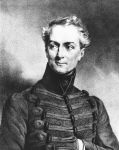 W
WCount Augustinos Ioannis Maria Kapodistrias was a Greek soldier and politician. He was born in Corfu. and studied geology. Augustinos Kapodistrias was the younger brother of Viaros Kapodistrias and of the first Governor of Greece Ioannis Kapodistrias.
 W
WNikolaos Kasomoulis was a participant in the Greek Revolution of 1821, and one of the main historical sources about it.
 W
WTheodoros Kolokotronis was a Greek general and the pre-eminent leader of the Greek War of Independence (1821–1829) against the Ottoman Empire. Kolokotronis's greatest success was the defeat of the Ottoman army under Mahmud Dramali Pasha at the Battle of Dervenakia in 1822. In 1825, he was appointed commander-in-chief of the Greek forces in Peloponnese. Today, Kolokotronis ranks among the most prominent figures in Greece's War of Independence.
 W
WAlexandros Kontostavlos was a Greek banker, magnate and politician.
 W
WArchbishop Kyprianos of Cyprus was the head of the Cypriot Orthodox Church in the early 19th century at the time that the Greek War of Independence broke out.
 W
WGeorgios Lassanis (1793–1870) was a scholar and politician from Kozani, Greece.
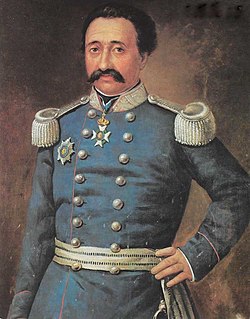 W
WAndreas S. Londos was a Greek military leader and politician. Born in Vostitsa in 1786, he was initiated into the Filiki Eteria in 1818, and was one of the first military leaders to raise the banner of revolt in the Peloponnese during the Greek War of Independence.
 W
WAnastasios Manakis or Michaloglou was a Greek revolutionary of the Greek War of Independence.
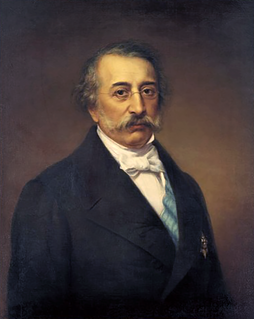 W
WAlexandros Mavrokordatos was a Greek statesman, diplomat, politician and member of the Mavrocordatos family of Phanariotes.
 W
WPetros Mavromichalis, also known as Petrobey, was a Greek general, politician and the leader of the Maniot people during the first half of the 19th century. His family had a long history of revolts against the Ottoman Empire, which ruled most of what is now Greece. His grandfather Georgios and his father Pierros were among the leaders of the Orlov Revolt.
 W
WDimitrios Meletopoulos was a Greek revolutionary leader of the Greek War of Independence and later a politician.
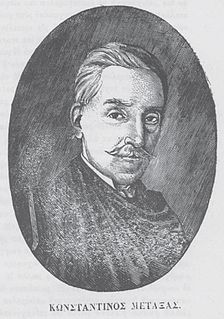 W
WKonstantinos Metaxas was a Greek fighter of the Greek War of Independence and politician from Cephalonia.
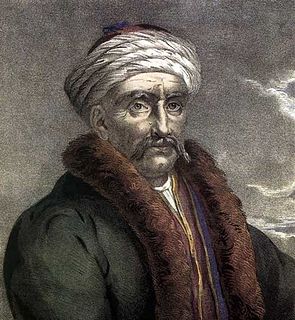 W
WPanoutsos Notaras was a Greek revolutionary and politician who was a leading figure of the Greek War of Independence, serving several times as president of the Greek national assemblies and legislative bodies.
 W
WGiorgakis Olympios was a Greek armatolos and military commander during the Greek War of Independence against the Ottoman Empire. Noted for his activities with the Filiki Eteria in the Danubian Principalities, he is considered to be a leading figure of the Greek Revolution.
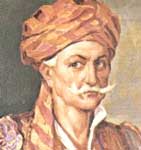 W
WDimitrios Panourgias/Panourias, a Greek military commander during the Greek War of Independence, was born Dimitrios Xiros in the village of Dremissa, Phocis.
 W
WGrigorios Dimitrios Dikaios-Flessas, popularly known as Papaflessas was a Greek priest and government official who became one of the most influential figures during the Greek War of Independence. The prefix papa-code: ell promoted to code: el in the name Papaflessas indicates his status as a cleric since the word means 'priest' in Greek. He was appointed Archimandrite in 1819. He served as Minister of Internal Affairs and Chief of Police in the government of Alexander Mavrokordatos. Papaflessas was killed during the Battle of Maniaki on May 20, 1825, fighting against the forces of Ibrahim Pasha at Maniaki, Messinia.
 W
WEmmanouel Pappas was a prominent member of Filiki Eteria and leader of the Greek War of Independence in Macedonia.
 W
WChristoforos Perraivos was a Greek officer of the Greek War of Independence, member of the Filiki Eteria and author. In non-Greek sources his name is usually found as Per(r)evo(s).
 W
WEfstratios Pissas was a Greek revolutionary of the Greek War of Independence and an officer in the Greek Army.
 W
WGerasimos Pitsamanos or Pitzamanos was a Greek architect and portrait painter. Most of his known works are watercolors.
 W
WIoannis or Yannakis Rangos was a Greek armatolos of the 19th century and fighter in the Greek War of Independence.
 W
WPanagiotis Sekeris was a merchant and a leading member of Filiki Eteria. His archive, an important and reliable source for the history of Filiki Eteria, consists of 14 documents and a very comprehensive manuscript, which contains accounts of Filiki Eteria, copies of 89 letters of Panagiotis Sekeris from Constantinople and Odessa, from August 1818 until August 1821, as well as a list of 520 members with the marks of recognition of each one.
 W
WGeorgios Sisinis was a Greek politician and a leader of the Greek War of Independence.
 W
WNikolaos Skoufas was a founding member of the Filiki Eteria, a Greek conspiratorial organization against the Ottoman Empire.
 W
WMichael Soutzos, was a member of the Soutzos family of Phanariotes, he was the grandson of Michael Drakos Soutzos; he was in turn a Prince of Moldavia, between 12 June 1819 and 29 March 1821. He was initiated into Filiki Eteria, he supported the Greek revolution in Moldavia and Wallachia and after the creation of the Greek state, he served as ambassador of the country abroad.
 W
WMelchisedek Tsouderos was a Greek monk and fighter of the Greek War of Independence from Crete. He was killed in 1823 in a battle against the Ottoman forces.
 W
WSpyridon Valettas was a Greek scholar, a member of the Filiki Eteria and for a short time the first minister of education and ecclesiastics affairs in the short-lived government of Alexandros Mavrokordatos in 1841.
 W
WIoannis Varvakis, also known as Ivan Andreevich Varvatsi, was a Greek distinguished member of the Russian and Greek communities, national hero, member of the Filiki Eteria and benefactor of the places where he lived.
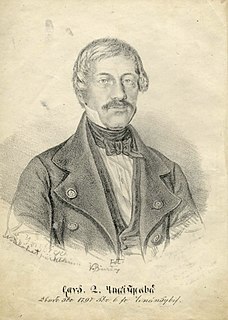 W
WNaum Veqilharxhi, born Naum Panajot Bredhi (1797–1846), was an Albanian lawyer and scholar. In 1844, he created a unique alphabet for the Albanian language using characters he had created himself, the Vithkuqi script. Veqilharxhi is one of the most prominent figures of the early Albanian National Awakening, and is considered by Albanians as its first ideologue.
 W
WAlexakis Vlachopoulos, also known as Alexis Vlachopoulos, was an armatolos, fighter in the Greek Revolution for Independence of 1821, congressman, and Minister of Defense. He was, also, a member of the Filiki Eteria.
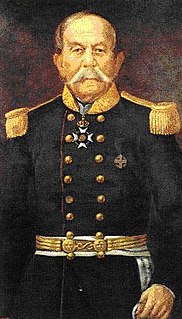 W
WKonstantinos Vlachopoulos was an armatolos, army leader of the Greek War of Independence and the first Greek commander of the Greek Royal Gendarmerie. He was also a member of the Filiki Eteria, a secret organization whose purpose was to overthrow the Ottoman rule of Greece and establish an independent Greek state.
 W
WTudor Vladimirescu was a Romanian revolutionary hero, the leader of the Wallachian uprising of 1821 and of the Pandur militia. He is also known as Tudor din Vladimiri or, occasionally, as Domnul Tudor.
 W
WEmmanuil Xanthos was a Greek merchant. He was one of the founders of the Filiki Eteria, a Greek conspiratorial organization which opposed the Ottoman Empire.
 W
WSevasti Xanthou (1798–?) was the wife of Emmanuil Xanthos, member and one of the founders of Filiki Eteria, a Greek conspiratorial organization against the Ottoman Empire.
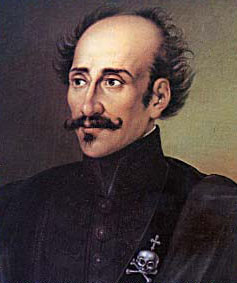 W
WAlexandros Ypsilantis was a Greek nationalist politician who was member of a prominent Phanariot Greek family, a prince of the Danubian Principalities, a senior officer of the Imperial Russian cavalry during the Napoleonic Wars, and a leader of the Filiki Etaireia, a secret organization that coordinated the beginning of the Greek War of Independence against the Ottoman Empire.
 W
WDemetrios Ypsilantis was a member of the prominent Phanariot Greek family Ypsilantis, dragomans of the Ottoman Empire. He served as an officer in the Imperial Russian Army and played an important role in the Greek War of Independence. Ypsilantis was the brother of Alexander Ypsilantis, leader of Filiki Eteria.
 W
WEvangelis or Evangelos Zappas was a Greek patriot, philanthropist and businessman who spent most of his life in Romania. He is recognized today as one of the founders of the modern Olympic Games, which were held in 1859, 1870, 1875, and 1888 and preceded the Olympic Games that came under the auspices of the International Olympic Committee. These Games, known at the time simply as Olympics, came before the founding of the International Olympic Committee itself. The legacy of Evangelis Zappas, as well as the legacy of his cousin Konstantinos Zappas, was also used to fund the Olympic Games of 1896.